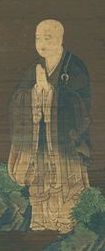Koso Wasan 64
If women did not entrust themselves to Amida's Name and Vow,
They would never become free of the five obstructions,
Even though they passed through myriads of kalpas;
How, then, would their existence as women be transformed?
The Status of Women

This verse presents us with the second reference, in Shinran's hymns, to the thirty-fifth Vow of Amida Buddha, which is known as 'the Vow that all women attain birth in Amida's Pure Land through hearing the Name.'
This new reference is much more significant, because behind it lies the thundering authority of the wise and compassionate heart of Amida Buddha, expressed through Shan-tao. It is also particularly significant that the series of verses that praises the life and work of Shan-tao opens with a reference to the status of women. This is because the Pure Land tradition - especially from the time of Shan-tao - has been unequivocal in its recognition that, in the dharma, women are of equal status with men. In this respect the Pure Land tradition, underwritten by its primary resources - especially the Larger Sutra and the Nirvana Sutra - is unique.
In discussing the nature of shinjin in the Kyo Sho Shin Sho Shinran Shonin is unequivocal about the the relevance of gender to birth in the Pure Land:
In reflecting on the great ocean of shinjin, I realize that there is no discrimination between noble and humble or black-robed monks and white-clothed laity, no differentiation between man and woman, old and young. 1
And so it has been for all Pure Land Buddhism since the time of Shan-tao. It is just a topic that is not laboured or broached, probably because of the ancient teaching of Shakyamuni Buddha himself, in for example, the the Nirvana Sutra.
1. CWS p 107.